Malcolm ZoppiSun Oct 15 2023
Do I Need a Lawyer for Buying a Business?
Buying a business requires careful steering and manoeuvring. Find out how a lawyer can help you through the process.

Ever wondered, “Do I need a lawyer for buying a business?” Let’s walk through this process together. We’ll explore the myriad ways a lawyer can smoothen the path leading to the acquisition of a business, from due diligence to negotiation, and from understanding business assets and liabilities to managing employee matters. Buckle up for an insightful journey that will equip you with knowledge and confidence for your next business acquisition.
Short Summary
- A lawyer is essential for providing legal advice and assistance throughout the business acquisition process.
- Services provided include due diligence, contract drafting/review, negotiation support, understanding assets & liabilities and intellectual property transfers.
- The cost of hiring a lawyer can range from 1% to 2% of the acquisition cost depending on complexity of the transaction.
The Role of a Lawyer in the Business Acquisition Process
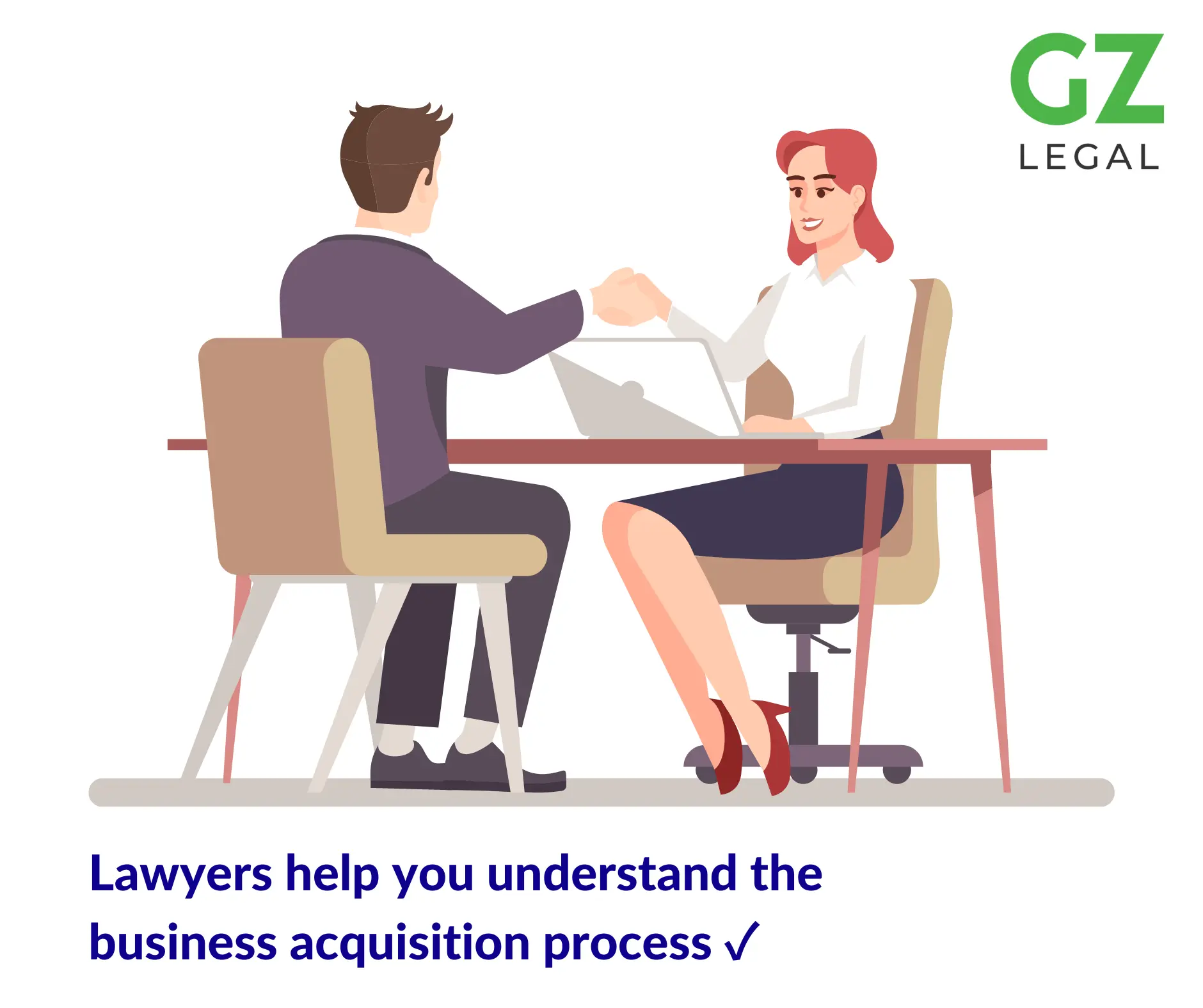
Delving into the business acquisition process, a lawyer’s role is pivotal. A specialist acquisition lawyer can offer assistance with due diligence, draft and review legal contracts, and also provide support with negotiations. When the existing business structure begins to become more complex during the acquisition process, engaging a solicitor becomes highly advisable.
Of course, there are certain tasks that can be accomplished independently to save money, especially if one is a sole trader with a straightforward business that doesn’t require an asset purchase agreement. However, the expense associated with engaging a lawyer for most business sales and acquisitions is well worth the investment, and will vary depending on the intricacy of the transaction and the lawyer’s expertise.
Due Diligence Assistance
Imagine walking into a maze blindfolded. That’s what buying a business without conducting due diligence can feel like. Due diligence is the process of conducting an assessment of the business’s physical assets, examining the business accounts, and confirming that there are no factors that could negatively impact the value of the goodwill being purchased. It acts as a safeguard to protect buyers from making ill-advised investments that may contain concealed risks or variables that are not readily discernible.
Now remove that blindfold and replace it with the expert guidance of a lawyer. A lawyer can provide invaluable assistance in the due diligence process by conducting comprehensive investigations, verifying that all legal requirements are fulfilled, and drafting and reviewing legal contracts. They can also raise pertinent questions with the seller’s solicitor, provide detailed technical information for the buyer to review, conduct property searches, and conduct other legal enquiries that could impact the legal ownership and validity of the business.
Contract Drafting and Review
Business contracts are the lifeblood of any business, and in a business acquisition, they hold the reins for a smooth transition. Lawyers can draft and review contracts (such as the sale and purchase agreement) to ensure they are legally compliant and safeguard the business buyers’ interests. Typically, the seller’s solicitor drafts the initial version of the sale agreement.
The significance of contract drafting and review cannot be overstated. The contract delineates the respective legal rights and responsibilities of both parties. Failing to properly define these rights and responsibilities can lead to disputes, or potentially render any agreement void. Moreover, the contract specifies, among other things, the purchase price, payment terms, and legal transfer of ownership of assets or shares.
Negotiation Support
Entering the negotiation arena can be daunting, but not when you have a lawyer by your side. Lawyers can provide expert guidance and support during negotiations, assisting buyers in obtaining the most advantageous deal. They can offer advice on the terms of the agreement, highlight any potential risks, and negotiate on behalf of the buyer to secure the best possible outcome.
Imagine going to a negotiation table equipped with a shield and a sword. The lawyer’s expert guidance acts as a shield, protecting you from potential pitfalls, while their negotiation skills are the sword, helping you secure the best deal. So, whether you’re a seasoned business buyer or a novice, a lawyer’s negotiation support can be a game-changer.
Understanding Business Assets and Liabilities
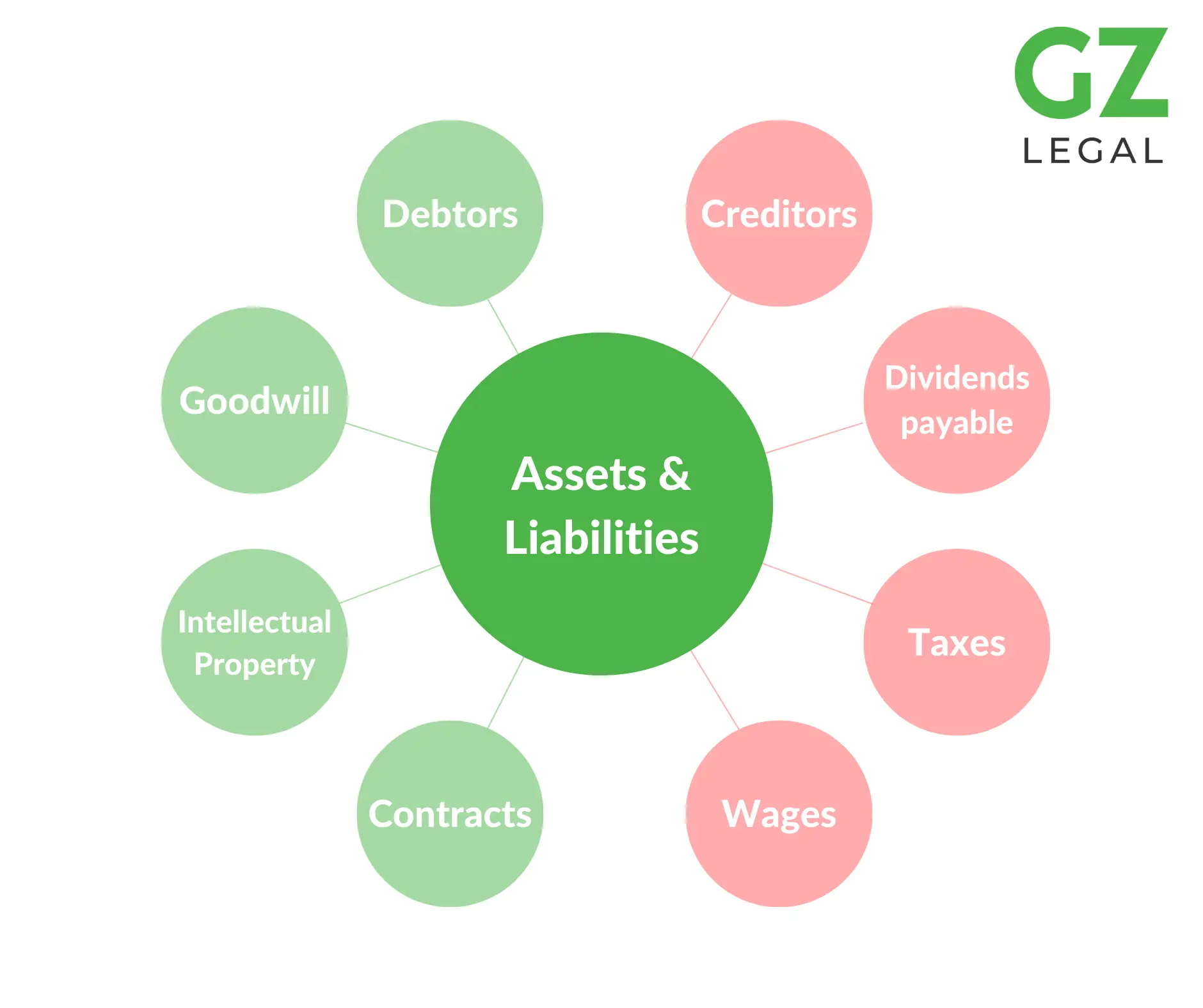
Before diving deep into the acquisition process, it’s crucial to don your detective hat and investigate the business’ assets and liabilities. This includes, for example, understanding the debts, property and goodwill of the business. This critical step is like a pre-flight check for a pilot, ensuring that all systems are functioning correctly before takeoff.
Here, lawyers can act as your co-pilot, helping you navigate through the business’ assets and liabilities. They provide clarity on any financing and leases associated with the business that will be assumed upon purchase, while ensuring that any personal debts in the owner’s name will not be transferred. They also guide you in understanding the book debts and liabilities, which are sometimes retained by the seller, but can be negotiated on a case-by-case basis.
Intellectual Property
Intellectual property, often the hidden treasure within a business, encompasses branding elements, confidential information, trademarks, copyrights and patents. Consider it the secret recipe that gives a business its unique flavour and competitive edge.
A lawyer can help identify and transfer these rights correctly during a business acquisition. They ensure that the intellectual property continues to thrive under your stewardship, adding value to your business.
Business Debts
Every business has its fair share of debts and liabilities. These are like the shadows that follow a business, often ignored but always present. They refer to any liabilities that a company has taken on prior to the acquisition. Fear not, a lawyer can help you understand and manage these shadows. They can assist buyers in understanding the debt terms, negotiating with creditors, and ensuring that the debt is transferred correctly to the new owner.
Navigating Commercial Property Transactions
Commercial property transactions can be like an intricate dance, with many steps and turns. A commercial property solicitor can provide assistance with the transfer of leases and the purchase of property during a asset acquisition deal. Their expertise is invaluable, especially when dealing with commercial property, such as business premises.
Lease Transfers
A lease transfer is a key step in the business acquisition. Solicitors can provide legal services to facilitate the transfer of existing leases to the new business owner. It’s the process of transferring the ownership of a lease from one person or entity to another, often requiring careful negotiation with the freehold owner to ensure that a valid assignment occurs. Lawyers can choreograph this step, ensuring a smooth and correct transfer.
Property Purchase
The property purchase process in a business acquisition requires careful steering. It involves the transfer of property from one individual to another, and a lawyer can provide assistance to buyers in the process of acquiring commercial property, such as conducting due diligence, drafting contracts and registering the buyer as the new owner.
Regulatory Compliance and Licensing
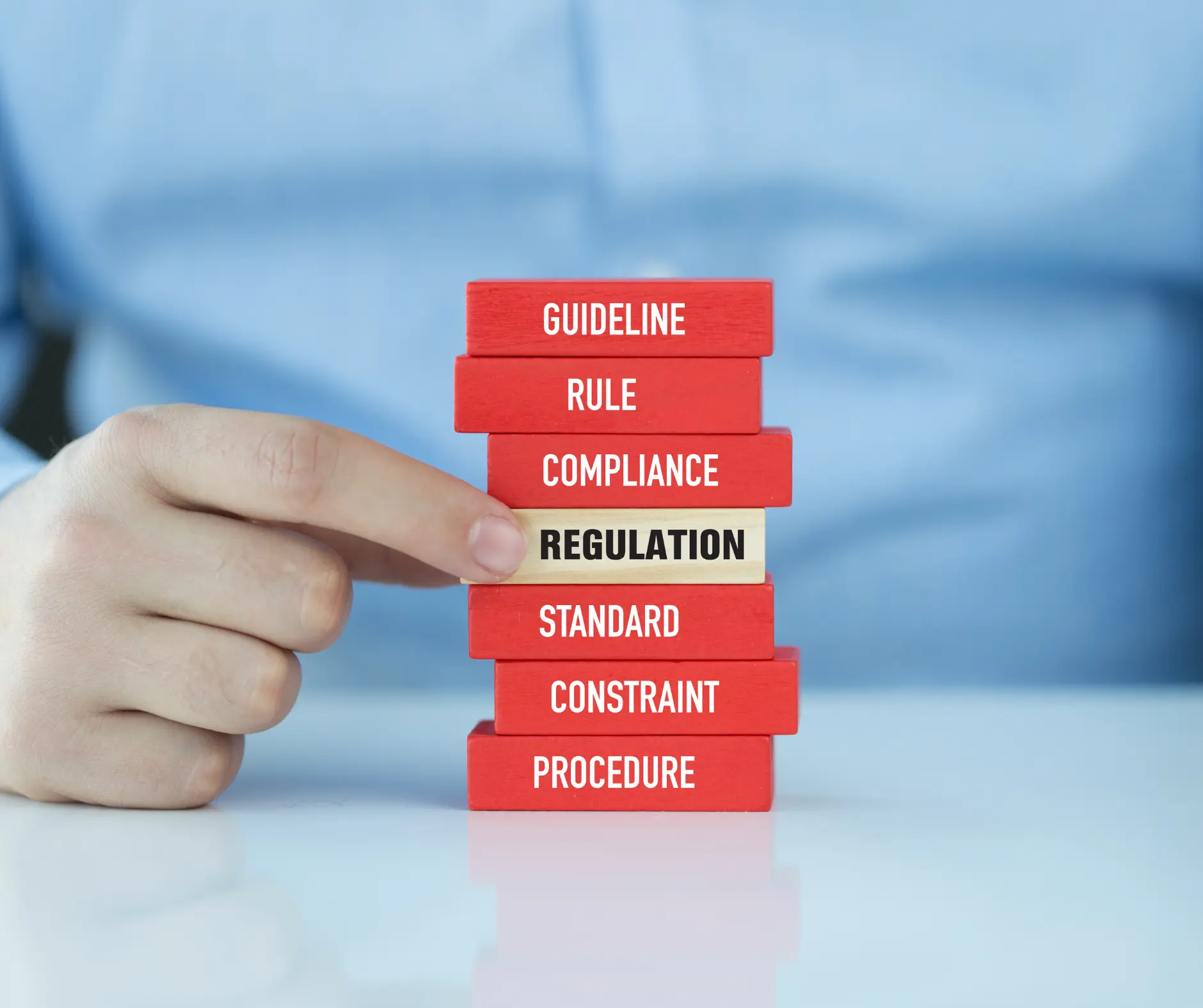
Just as a symphony follows a musical score, a business must adhere to regulatory compliance and licensing. This ensures adherence to laws, regulations, and guidelines set forth by the government or other regulatory bodies. It is essential for businesses to comply with these regulations to avoid legal sanctions and guarantee the safety of their customers and employees.
Lawyers at law firms can act as your conductors, ensuring your business stays in harmony with regulatory compliance and licensing. They can assist with helping the buyer understand what is required under the licence, the license transfer and obtaining new licences
Licence Transfers
A licence transfer is a key note in the business acquisition symphony. It’s the process of transferring the ownership of a licence from one person or entity to another, which involves making an application for the transfer of the licence. Lawyers can conduct this process on the buyer’s behalf, ensuring a smooth and correct transfer.
Obtaining New Licences
Obtaining new licences is like adding a new instrument to your business symphony. It requires fulfilling certain criteria, submitting an application, providing relevant documents, and paying applicable fees.
A lawyer can provide assistance to buyers in navigating the application process for new licences and clearly explain the value of the licence to the business being bought.
Employee Matters and Legal Obligations
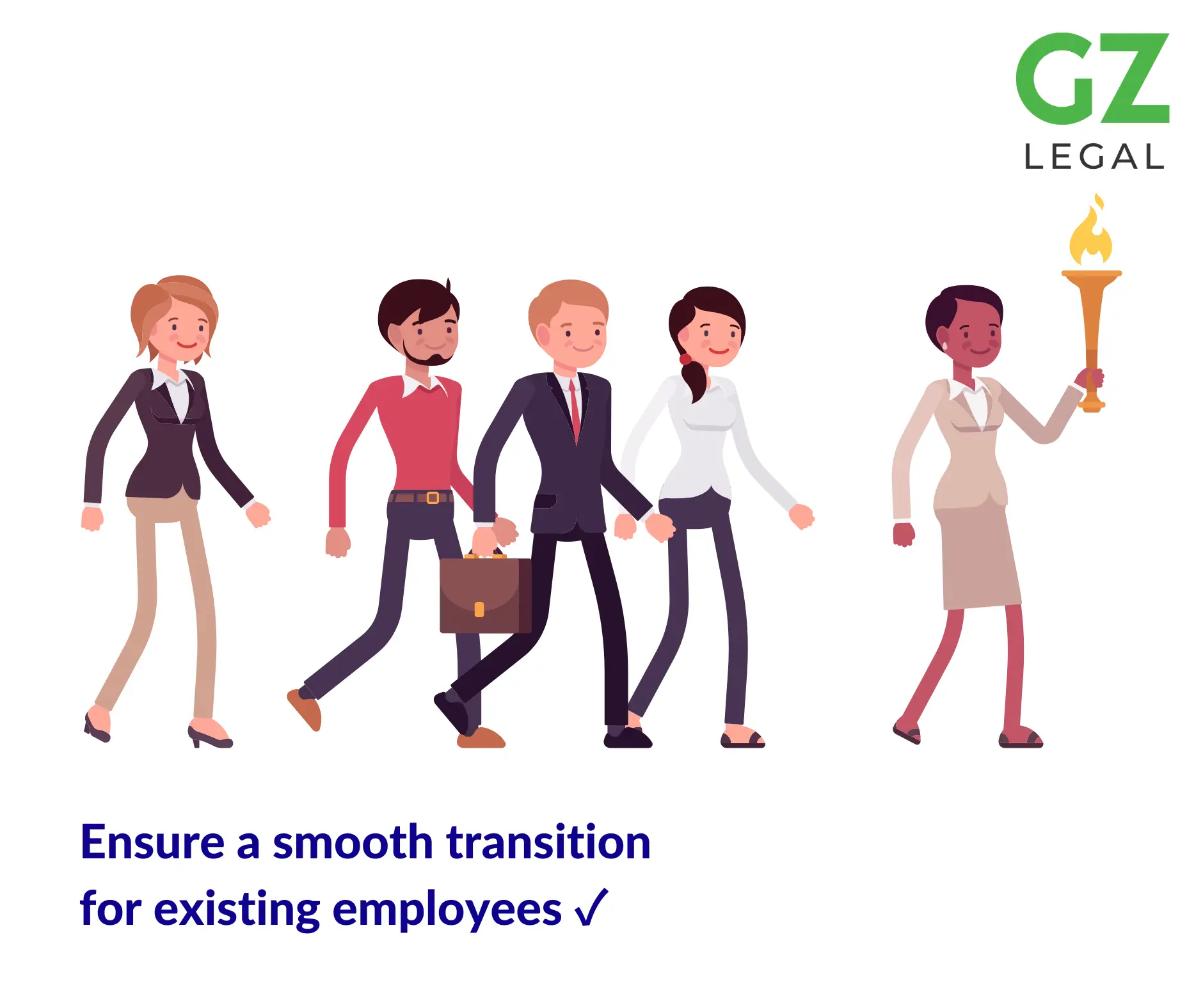
Employees are the heartbeat of a business, and addressing their matters and legal obligations is crucial when buying a business. Lawyers can help with the transfer of employment contracts and resolving potential disagreements.
The Transfer of Undertakings (Protection of Employment) Regulations 2006 (TUPE) governs the transfer of employment contracts. Upon the transfer of a business, the new employer assumes the existing employees’ employment contracts, including all terms and conditions, and continuity of employment is maintained.
Transfer of Employment Contracts
The transfer of employment contracts is like a relay race, where the baton is passed from one runner to another. It involves the new employer assuming the previous employers responsibilities and obligations to the existing employees.
Lawyers can ensure this relay race goes smoothly, providing guidance to make sure the transfer of employment contracts is completed in accordance with the applicable TUPE regulations.
Addressing Potential Disputes
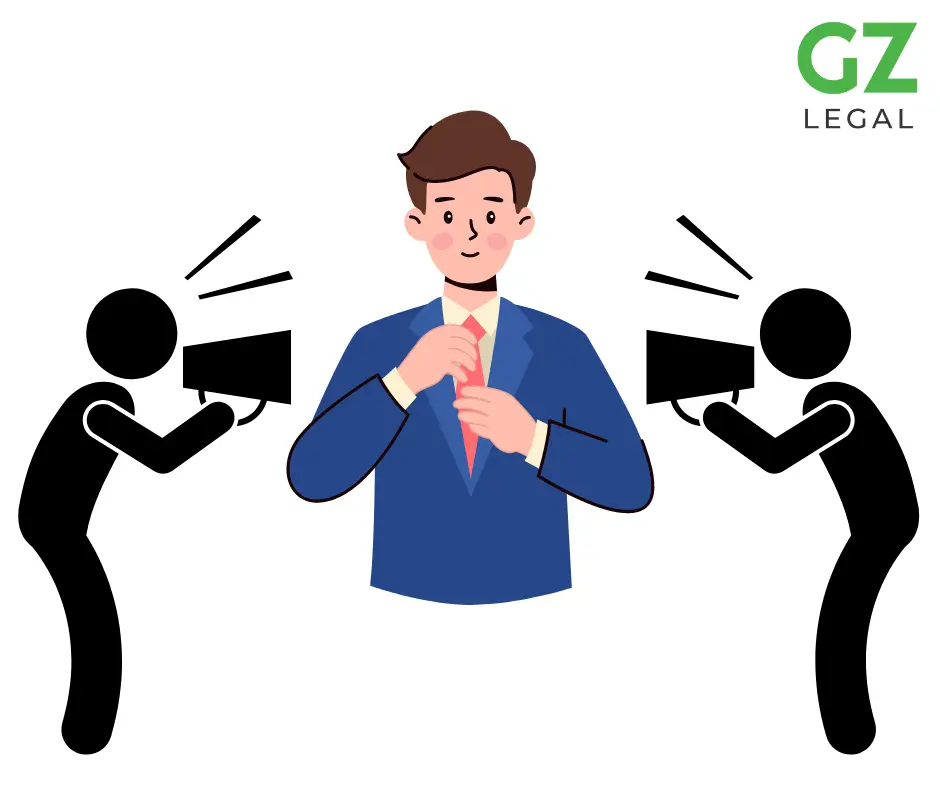
In any business transaction, there’s always the potential for disputes. In the context of a business acquisition, potential disputes may arise from unclear or undisclosed contracts, unforeseen or undisclosed liabilities, deal complexities, differing interpretations of accounting principles, breach of warranties, post-completion disputes, regulatory issues, and purchase price earn-out provisions.
Lawyers can act as your dispute resolution specialists, providing legal assistance to ensure any potential disputes are addressed at an early stage, facilitating a smooth transition during the acquisition process.
Cost of Hiring a Lawyer for Business Acquisition
Like hiring any professional advisor, engaging a lawyer for a business acquisition comes with its costs, which can vary depending on the scale and intricacy of the business being acquired.
Typically, the cost of hiring a lawyer for a business acquisition can range from 1% to 2% of the value of the deal, depending on the complexity of the transaction, the level of due diligence required, and the lawyer’s experience. However, one should not underestimate the value of a lawyer’s input. Consider it an investment in your new business, ensuring you’re well-equipped proceed with the acquisition safe in the knowledge that your interests are protected. This investment will help pave the way for your new business to thrive well into the long term.
Summary
As we cross the finish line, it becomes clear that the process of buying a business is not a solo sprint, but more of a team race. Whether it’s due diligence, negotiating contracts, understanding business assets and liabilities, or navigating employee matters, having a lawyer on your team can make the difference between a smooth transition and a bumpy ride. By investing in legal expertise, you’re not just buying a business, you’re setting it up for a successful future.
Contact one of our specialist acquisition lawyers here at GZ legal to find out how we can help you to meet your business acquisition needs!
Frequently Asked Questions
Why do I need a solicitor to buy a business?
Having a solicitor is essential when buying a business, as they can provide legal support and advice on matters such as business agreements, licences and leases. It is particularly important if the business has a commercial property associated with it.
A solicitor can also offer assistance with due diligence, draft and review legal contracts, and provide support with negotiations
Having a solicitor on board can help ensure that the process of buying a business runs smoothly and that all legal requirements are met. They can also provide advice on any potential risks associated with the purchase, and help to ensure that the purchase is safe.
Do you need solicitor to sell business?
It is not necessary to use a solicitor when selling a business, but it is strongly advised. Just like if you were buying a business, they will help you draft the initial sale and purchase agreement, negotiate with the buyer, and ensure that you make a clean break with your business.
What do you need to do when you buy a business?
To buy a business successfully, you need to get professional advice, research the market thoroughly, arrange financing, make a formal offer and negotiate the terms of purchase, before completing the acquisition.
It is important to seek out the advice of professionals who have experience in the field of business acquisitions. They can provide valuable insight into the process and help you make informed decisions. Additionally, researching the market thoroughly is essential to ensure that you are making a sound investment.
Here at GZ Legal, we specialise in assisting our clients focus on the essential aspects to ensure a successful business acquisition. Click here to find out more about how we can help you.
Why is understanding a business’s assets and liabilities important before purchasing?
Understand a business’ assets and liabilities is essential before the purchase in order to ensure an informed decision is made and any potential hidden costs are identified.
It is important to assess the financial health of the business, including its cash flow, debt levels, and profitability. Additionally, it is important to consider the intangible assets of the business, such as its brand and customer base.
Find out more!
If you want to read more in this subject area, you might find some of our other blogs interesting:
- Step-by-Step Guide on How to Transfer Shares to a Holding Company
- Breach of Settlement Agreement: Consequences and Remedies Explained
- Who Gets the Money When a Company is Sold?
- What is a Counter Offer in Contract Law? Explained Simply and Clearly
- Understanding the Costs: How Much Do Injunctions Cost in the UK?